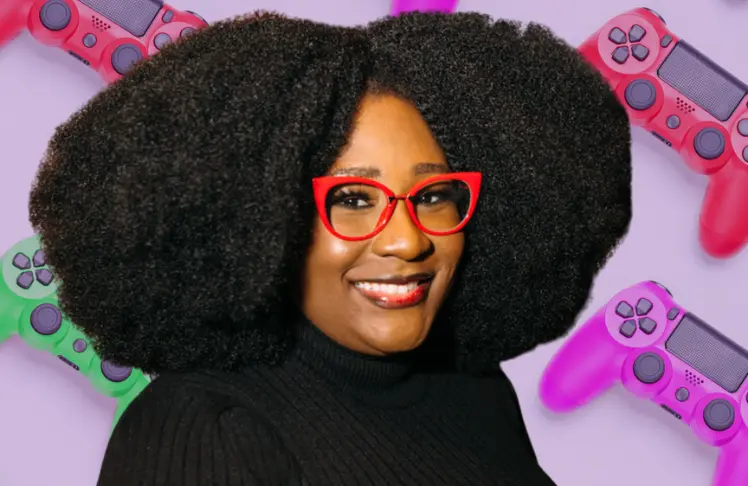
Jerry Lawson and Ed Smith, Black pioneers in the gaming industry, revolutionized home gaming in the 1970s. Lawson made video games playable at home, while Smith reimagined at-home consoles to be more user-friendly.
Never heard of them? That’s no surprise. The gaming industry has a long history of ignoring the contributions of Black game developers and Black gamers.
“We get treated like we don’t exist. Everything from the creation of games to products, we’re not thought of, or we’re an afterthought,” Amira Virgil, a 30-year-old gaming content creator and community organizer, tells Word In Black. “When it comes to our content, a lot of Black people get ignored.”
Virgil has been in the gaming world since she first started playing at age 4. At 22, she officially joined the gaming industry by creating Black-focused gaming content on YouTube.
It doesn’t matter what game you play. This is a general, industry-wide issue.
AMIRA VIRGIL, GAMING CONTENT CREATOR AND COMMUNITY ORGANIZER
Black Americans are the second largest racial or ethnic demographic of gamers in the United States, after Asian Americans. But Virgil says she has experienced and observed a culture of exclusion and hostility toward Black gamers — and she’s working to change it.
Virgil says most gaming forums — communities that connect gamers and game developers to each other and resources — keep Black people out. That’s why Virgil began launching her own forums to provide Black gamers and game developers with recognition and the support they need to excel.
“I looked around and noticed that things were not that good for Black gaming creators. I went into problem-solving mode and tried to figure out some ways we can fix this. What are some ways we can help elevate Black gamers and creators?” Virgil says.
“In the beginning, a lot of the focus was within my niche, which is the Sims, and over time, I realized this wasn’t a Sims issue. It doesn’t matter what game you play. This is a general, industry-wide issue.”
In 2016, Virgil created The Black Simmer to “help platform other Black Simmers, to give them that safe space to share their content in peace, and to show people that there is a whole community of us.” She says thousands of Black gamers “play and consume this game every day.”
The Black Simmer community has grown to over 20,000 members and inspired other Black gamers to start their own forums centered around the games they enjoy most.
Why Racial Equity in Gaming Matters
It’s just video games, though, right? Why does it matter if Black people get a piece of the pie? Well, it’s a very large pie. The video game industry is one of the most highly lucrative tech sectors globally, bringing in $159.3 billion annually. Without equal access to gaming, Black folks are being denied the opportunity to build wealth for themselves and their families.
In 2020, Virgil created a second forum, The Noir Network, to help Black women navigate the business side of gaming so that they, too, can build lasting careers and financial stability. The Noir Network educates Black women in gaming on how to interface with gaming companies and agencies and how to best negotiate brand deals, and offers members much-needed resources like gaming codes and computers. The network also recommends members for campaigns and directly connects them with gaming publishers.
I hope that my legacy will encourage people to push forward even when you have so many external sources saying you can’t.
AMIRA VIRGIL, GAMING CONTENT CREATOR AND COMMUNITY ORGANIZER
“A lot of the things we’re conditioned to believe we’re supposed to do for free, we’re actually supposed to be getting paid, and a lot more than what people think,” Virgil says. “[I’m] really just bridging that gap and making sure my peers have the tools they need to be successful and continue.”
Attention to Diverse Details
In addition to uplifting Black gamers and developers through her community forums, Virgil is helping to diversify games, too. Last year, she participated in a Dove campaign with Afro Hair Library to create an extensive database of accurate Black hair textures for game developers to use. Virgil flew to the United Kingdom to serve as a hair model and share her experience as a Black woman in gaming. The experience was transformative for Virgil, who was thrilled to finally see care being put into developing Black video game characters.
“I’ve been gaming since I was 4, so I’ve seen the raggedy hair, the struggle ‘fros, the disconnected cornrows — just a lot of hairstyles that make Black characters and games looked unloved, and the lack of care and attention that goes into making Black hair due to the lack of resources online and in the industry,” she says. “These companies and developers have absolutely no excuse anymore because these beautiful hair books and young animators are coming out and creating amazing things.”
As for what’s next for Virgil, the power of legacy is on her mind.
“I hope that my legacy will encourage people to push forward even when you have so many external sources saying you can’t,” she says. And if other Black gamers take away anything from her story, Virgil hopes it will be to know there is reward in perseverance.
“I hope that I can influence the people who come after me, regardless of race or demographic, that if you want to do something, just do it.”















